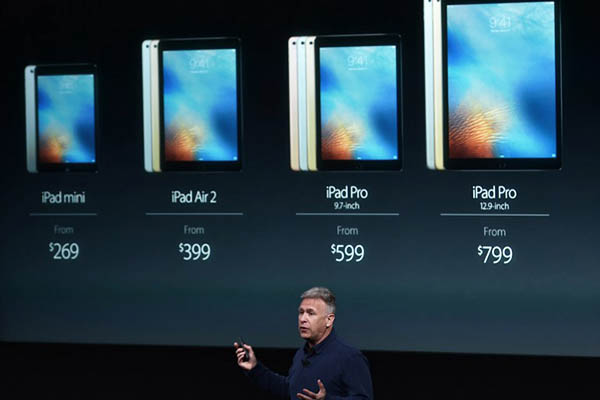
Josh Edelson—AFP
New models of popular gadgets focus on smaller sizes, cheaper prices.
Apple went small on Monday—cutting prices as well as screen size—as it unveiled a new iPhone and iPad aimed at first-time buyers and customers in emerging markets.
The new launches came as the FBI moved to postpone a high-profile court battle with the U.S. government on encryption and data protection, saying it may have a way to break into an iPhone at the heart of that case. Apple chief executive Tim Cook stressed that protecting privacy is an obligation the tech giant “will not shrink from.”
A new iPhone SE will debut at $399 for U.S. customers without a contract subsidy, a significant cut from the price of Apple’s larger iPhones. Apple sold 30 million of its other small-screen iPhones in 2015, company vice president Greg Joswiak said, showing that many customers like the compact size—despite the trend toward bigger displays.
“Some people really love smaller phones,” Joswiak told the low-key event at Apple’s headquarters in Cupertino, California, unveiling the aluminum handset with upgraded specifications and other features including Apple Pay. “In some countries like China, for a majority of these customers, it is their first iPhone.”
The new iPhone model has strong potential in international markets beyond China, particularly in India, according to Creative Strategies analyst Tim Bajarin. Even though the price tag is higher than low-cost Android handsets that dominate the market, it puts the cherished Apple brand within better reach to people in developing economies. “It will be a good winner for them,” Bajarin said of the iPhone SE.
“While China is still growing, I think their next big market is India and this is a good first step toward an India focus.”
The iPhone SE will be aimed at first-time Apple buyers and those who want to upgrade from the iPhone 5S and 5C, which have not been updated in over two years. The iPhone 6S, the lowest-cost handset in the large-screen family, starts at $649.
Also unveiled at the event was a new iPad Pro that moves smaller—a 9.7-inch display compared with the 12.9-inch model on the original business-geared tablet. “It is a large enough display to get all your work done, but easy to carry around,” said Apple vice president Phil Schiller.
The smaller, new iPad starts at $599 for U.S. customers, down from around $800 for the original.
Apple took direct aim at Windows-powered personal computers, noting the large number of machines that are five or more years old but still in use. The iPad Pro has always been aimed at the business market, but “this is the first I have heard Apple say they were going after the PC crowd,” Bajarin said.
Apple will be taking orders Thursday for the new phone and tablet, with deliveries set for March 31, in the United States, Britain, Australia, Canada, China, France, Germany, Hong Kong, Japan, New Zealand and Singapore, with more markets to be added in April.
Apple is seeking “to kickstart the upgrade cycles for both iPhones and iPads,” said Jan Dawson at Jackdaw Research. “There’s considerable evidence that some of those who own smaller iPhones are holding onto them rather than upgrading to the new, larger iPhones.”
Dawson said in a blog post that he sees “significant pent-up demand within Apple’s base of iPhone owners who want a smaller iPhone with up-to-date specs and newer features.” But he added that “this pricing doesn’t get the iPhone down to the kind of prices needed to really spur sales in emerging markets.”
Apple also announced it was cutting the entry-level price for its Apple Watch to $299 from $349 as it unveiled a new nylon band for the device. Apple has not released sales figures for the smartwatch but analysts have said it has become the market leader.
Cook used the unveiling to reiterate his views on encryption and data protection. “We need to decide as a nation how much power the government should have over our data and our privacy,” he said. “We believe strongly we have an obligation to help protect your data and your privacy. We owe it to our customers. We will not shrink from this responsibility.”
The U.S. government said it might have found a way to crack the iPhone of one of the San Bernardino attackers without Apple’s help, potentially averting a major showdown that could have wide ramifications on digital security and privacy. A hearing had been set for Tuesday but a California judge granted the government’s request for a delay—with a status report now due April 5—based on the new developments.
Apple, backed by a broad coalition of technology giants like Google, Facebook and Yahoo, has argued that the FBI is seeking a “back door” into all iPhones as part of the probe into the December massacre that left 14 people dead. The U.S. Justice Department argues that its “modest” demand could help reveal vital evidence in a terror case.
